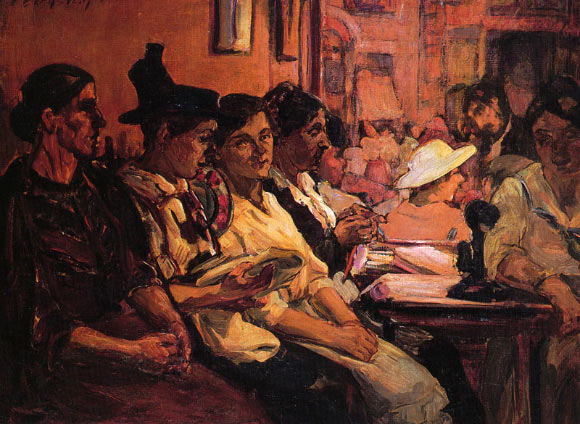Waiting actually does make people more patient, which can provide a payoff for consumers by helping them make better decisions, according to Dr Ayelet Fishbach and Dr Xiani Dai from the University of Chicago.

Waiting Room – Employment Office by Theresa Bernstein, 1917, oil on canvas. Image credit: The Jewish Museum, New York.
Historically, research on patience has been approached by offering people the choice between a smaller reward sooner or a larger reward later. Given the choice between USD 10 now or USD 15 later, for instance, many people choose the USD 10 now, even though it makes them less well-off financially.
“People tend to value things more in the present and discount their worth in the future. But my research suggests that making people wait to make a decision can improve their patience because the process of waiting makes the reward for waiting seem more valuable,” explained Dr Fishbach, who is a co-author of the paper published in the Journal of Organizational Behavior and Human Decision Processes.
To test their hypothesis, Dr Fishbach and Dr Dai conducted a series of experiments in the United States mainland China and Hong Kong.
In one study, they invited participants to sign up to join a subject pool for online studies. In exchange for signing up, all participants were invited to enter one of two lotteries: one would pay out a USD 50 prize sooner; the other would pay out a USD 55 prize later.
The participants were divided into three groups, each having to wait a different amount of time before given their potential prize: the first group was told they could win USD 50 in three days or USD 55 in 23 days; the second could win USD 50 in 30 days or USD 55 in 50 days; and the third group was told they could win USD 50 in 30 days or USD 55 in 50 days, but they had to wait before choosing a potential reward.
Researchers contacted members of the third group 27 days later to ask for a decision, at which point the participants, like those in the first group, had to choose between waiting three days or 23 days to potentially receive a prize.
The scientists found that in the first group only 31 percent of participants chose to wait for the larger reward. In the second group, that number rose to 56 percent. But among people in the third group, who had been waiting several weeks to make their choice, 86 percent chose to wait for the larger reward. Even though they were making the same choice as people in the first group, the fact that they had been waiting to choose increased their patience.
“When people wait, it makes them place a higher value on what they’re waiting for, and that higher value makes them more patient. They see more value in what they are waiting for because of a process psychologists call self-perception – we learn what we want and prefer by assessing our own behavior, much the same way we learn about others by observing how they behave,” Dr Fishbach said.
______
Bibliographic information: Xianchi Dai and Ayelet Fishbach. 2013. When waiting to choose increases patience. Organizational Behavior and Human Decision Processes, vol. 121, no. 2; doi: 10.1016/j.obhdp.2013.01.007







